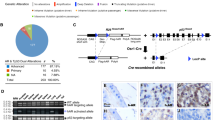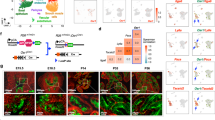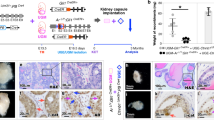Abstract
Steroid sex hormones can induce prostate carcinogenesis, and are thought to contribute to the development of prostate cancer during aging. However, the mechanism for hormone-induced prostate carcinogenesis remains elusive. Here, we report that activating transcription factor 3 (ATF3)—a broad stress sensor—suppressed hormone-induced prostate carcinogenesis in mice. Although implantation of testosterone and estradiol (T+E2) pellets for 2 months in wild-type mice rarely induced prostatic intraepithelial neoplasia (PIN) in dorsal prostates (one out of eight mice), the loss of ATF3 led to the appearance of not only PIN but also invasive lesions in almost all examined animals. The enhanced carcinogenic effects of hormones on ATF3-deficient prostates did not appear to be caused by a change in estrogen signaling, but were more likely a consequence of elevated androgen signaling that stimulated differentiation of prostatic basal cells into transformation-preferable luminal cells. Indeed, we found that hormone-induced lesions in ATF3-knockout mice often contained cells with both basal and luminal characteristics, such as p63+ cells (a basal-cell marker) showing luminal-like morphology, or cells double-stained with basal (CK5+) and luminal (CK8+) markers. Consistent with these findings, low ATF3 expression was found to be a poor prognostic marker for prostate cancer in a cohort of 245 patients. Our results thus support that ATF3 is a tumor suppressor in prostate cancer.
This is a preview of subscription content, access via your institution
Access options
Subscribe to this journal
Receive 50 print issues and online access
$259.00 per year
only $5.18 per issue
Buy this article
- Purchase on Springer Link
- Instant access to full article PDF
Prices may be subject to local taxes which are calculated during checkout







Similar content being viewed by others
References
Ricke WA, Wang Y, Cunha GR . Steroid hormones and carcinogenesis of the prostate: The role of estrogens. Differentiation 2007; 75: 871–882.
Prins GS, Korach KS . The role of estrogens and estrogen receptors in normal prostate growth and disease. Steroids 2008; 73: 233–244.
Bosland MC . The role of estrogens in prostate carcinogenesis: A rationale for chemoprevention. Rev Urol 2005; 7: S4–S10.
Noble RL . The development of prostatic adenocarcinoma in Nb rats following prolonged sex hormone adminstration. Cancer Res 1977; 37: 1929–1933.
Ricke WA, McPherson SJ, Bianco JJ, Cunha GR, Wang Y, Risbridger GP . Prostatic hormonal carcinogenesis is mediated by in situ estrogen production and estrogen receptor alpha signaling. FASEB J 2008; 22: 1512–1520.
Risbridger GP, Wang H, Frydenberg M, Cunha G . The metaplastic effects of estrogen on mouse prostate epithelium: Proliferation of cells with basal cell phenotype. Endocrinol 2001; 142: 2443–2450.
Risbridger G, Wang H, Young P, Kurita T, Wong YZ, Lubahn D et al. Evidence that epithelial and mesenchymal estrogen receptor-α mediates effects of estrogen on prostatic epithelim. Dev Biol 2001; 229: 432–442.
Culing Z, Klocker H, Bartsch G, Steiner H, Hobisch A . Androgen receptors in prostate cancer. J Urol 2003; 170: 1363–1369.
Gnanapragasam VJ, Robson CN, Leung HY, Neal DE . Androgen receptor signalling in prostate. BJU International 2000; 86: 1001–1013.
Bennett NC, Gardiner RA, Hooper JD, Johnson DW, Gobe GC . Molecular cell biology of androgen receptor signaling. Int J Biochem Cell Biol 2010; 42: 813–827.
Heemers HW, Tindall DJ . Androgen receptor (AR) coregulators: A diversity of functions converging on and regulating the AR transcriptional complex. Endocr Rev 2005; 28: 778–808.
Wang L, Hsu C-L, Chang C . Androgen receptor corepressors: An overview. Prostate 2005; 63: 117–130.
Wang H, Jiang M, Cui H, Chen M, Buttyan R, Hayward SW et al. The stress response mediator ATF3 represses androgen signaling by binding the androgen receptor. Mol Cell Biol 2012; 32: 3190–3202.
Hai T, Wolfgang CD, Marsee DK, Allen AE, Sivaprasad U . ATF3 and stress responses. Gene Expression 1999; 7: 321–325.
Yan C, Lu D, Hai T, Boyd DD . Activating transcription factor 3, a stress sensor, activates p53 by blocking its ubiquitination. EMBO J 2005; 24: 2425–2435.
Kang Y, Chen C, Massague J . A self-enabling TGFß response coupled to stress signaling: Smad engages stress response factor ATF3 for Id1 repression in epithelial Cells. Mol Cell 2003; 11: 915–926.
Gilchrist M, Thorsson V, Li B, Rust AG, Korb M, Roach JC et al. Systems biology approaches identify ATF3 as a negative regulator of Toll-like receptor 4. Nature 2006; 441: 173–178.
Hai T, Wolford CC, Chang Y-S . ATF3, a hub of the cellular adaptive-response network, in the pathogenesis of diseases: Is modulation of inflammation a unifying component? Gene Expr 2010; 15: 1–11.
Thompson MR, Xu D, Williams BR . ATF3 transcription factor and its emerging role in immunity and cancer. J Mol Med 2009; 87: 1053–1060.
Yan C, Boyd DD . ATF3 regulates the stability of p53: A link to cancer. Cell Cycle 2006; 5: 926–929.
Wang Z, Xu D, Ding H-F, Kim J, Zhang J, Hai T, Yan C . Loss of ATF3 promotes Akt activation and prostate cancer development in a Pten knockout mouse model. Oncogene 2015; 34: 4975–4981.
Wang Z, Yan C . Emerging roles of ATF3 in the suppression of prostate cancer. Mol Cell Oncol in press.
Wolford CC, McConoughey SJ, Jalgaonkar SP, Leon M, Merchant AS, Dominick JL et al. Transcription factor ATF3 links host adaptive response to breast cancer metastasis. J Clin Invest 2013; 123: 2893–2906.
Wang ZA, Toivanen R, Bergren SK, Chambon P, Shen MM . Luminal cells are favored as the cell of origin for prostate cancer. Cell Rep 2014; 8: 1339–1346.
Lapointe J, Li C, Higgins JP, Van De Rijn M, Bair E, Montgomery K et al. Gene expression profiling identifies clinically relevant subtypes of prostate cancer. Proc Natl Acad Sci USA 2004; 101: 811–816.
Tomlins SA, Mehra R, Rhodes DR, Cao X, Wang L, Dhanasekaran SM et al. Integrative molecular concept modeling of prostate cancer progression. Nat Genet 2007; 39: 41–51.
Lau K-M, LaSpina M, Long J, Ho S-M . Expression of estrogen receptor (ER)-α and ER-β in normal and malignant prostatic epithelial cells: Regulation by methylation and invovlvement in growth regulation. Cancer Res 2000; 60: 3175–3182.
Goldstein AS, Witte ON . Does the microenvironment influence the cell types of origin for prostate cancer? Genes Dev 2013; 27: 1539–1544.
Choi N, Zhang B, Zhang L, Ittmann M, Xin L . Adult murine prostate basal and luminal cells are self-sustained lineages that can both serve as targets for prostate cancer initiation. Cancer Cell 2012; 21: 253–265.
Kwon O-J, Zhang L, Ittmann MM, Xin L . Prostatic inflammation enhances basal-to-luminal differentiation and accelerates initiation of prostate cancer with a basal cell origin. Proc Natl Acad Sci USA 2014; 111: E592–E600.
Bonkhoff H, Remberger K . Differantiation pathways and histogenetic aspects of normal and abnormal prostatic growth: A stem cell model. Prostate 1996; 28: 98–106.
Berger R, Febbo PG, Majumder PK, Zhao JJ, Mukherjee S, Signoretti S et al. Androgen-induced differentiation and tumorigenicity of human prostate epithelial cells. Cancer Res 2004; 64: 8867–8875.
Okamoto A, Iwamoto Y, Maru Y . Oxidative stress-responsive transcription factor ATF3 potentially mediates diabetic angiopathy. Mol Cell Biol 2006; 26: 1087–1097.
Hoetzenecker W, Echtenacher B, Guenova E, Hoetzenecker K, Woelbing F, Bruck J et al. ROS-induced ATF3 causes susceptibility to secondary infections during sepsis-associated immunosuppression. Nat Med 2011; 18: 128–134.
Huang X, Li X, Guo B . KLF6 induced apoptosis in prostate cancer cells through upregulation of ATF3. J Biol Chem 2008; 283: 29795–29801.
Liu Y, Gao F, Jiang H, Niu L, Bi Y, Young CY et al. Induction of DNA damage and ATF3 by retigeric acid B, a novel topoisomeriase II inhibitor, promotes apoptosis in prostate cancer cells. Cancer Lett 2013; 337: 66–76.
Wang J, Zhu HH, Chu M, Liu Y, Zhang C, Liu G et al. Symmetrical and asymmertical division analysis provides evidence for a hierarchy of prostate epithelial cell lineages. Nat Commun 2014; 5: 4758.
Lu T-L, Huang Y-F, You L-R, Chao N-C, Su F-Y, Chang J-L et al. Conditionally ablated Pten in prostate basal cells promotes basal-to-luminal differentiation and causes invasive prostate cancer in mice. Am J Pathol 2013; 182: 975–991.
Ding Z, Wu CJ, Chu GC, Xiao Y, Ho D, Zhang J et al. SMAD4-depdenent barrier constrains prostate cancer growth and metastatic progression. Nature 2011; 470: 269–273.
Mulholland DJ, Tran LM, Li Y, Cai H, Morim A, Wang S et al. Cell autonomous role of PTEN in regulating castration-resistant prostate cancer growth. Cancer Cell 2011; 19: 792–804.
Carverm BS, Chapinski C, Wongvipat J, Hieronymus H, Chen Y, Chandarlapaty S et al. Reciprocal feedback regulation of PI3K and androgen receptor signaling in PTEN-deficient prostate cancer. Cancer Cell 2011; 19: 575–586.
Hartman MG, Lu D, Kim ML, Kociba GJ, Shukri T, Buteau J et al. Role for activating transcription factor 3 in stress-induced β-cell apoptosis. Mol Cell Biol 2004; 24: 5721–5732.
Ran FA, Hsu PD, Wright J, Agarwala V, Scott DA, Zhang F . Genome engineering using the CRISPR-Cas9 system. Nat Protoc 2013; 8: 2281–2308.
Acknowledgements
This work was supported by NIH grants R01CA139107 and R01CA164006, and a Department of Defense award W81XWH-15-1-0049 to CY. We thank Dr Ahmed Chadli for providing the PR antibody.
Author contributions
ZY bred the mice and carried out the experiments with the help of YT, HD, JZ and JKC. JK performed statistical analyses of the TCGA data. TH provided the ATF3−/− mice and analyzed the data. HD, JZ, TH and JKC edited the manuscript. CY conceived the study, analyzed the data and wrote the manuscript.
Author information
Authors and Affiliations
Corresponding author
Ethics declarations
Competing interests
The authors declare no conflict of interest.
Rights and permissions
About this article
Cite this article
Wang, Z., Kim, J., Teng, Y. et al. Loss of ATF3 promotes hormone-induced prostate carcinogenesis and the emergence of CK5+CK8+ epithelial cells. Oncogene 35, 3555–3564 (2016). https://doi.org/10.1038/onc.2015.417
Received:
Revised:
Accepted:
Published:
Issue Date:
DOI: https://doi.org/10.1038/onc.2015.417
This article is cited by
-
Impact of RUNX2 on drug-resistant human pancreatic cancer cells with p53 mutations
BMC Cancer (2018)
-
ATF3 inhibits the tumorigenesis and progression of hepatocellular carcinoma cells via upregulation of CYR61 expression
Journal of Experimental & Clinical Cancer Research (2018)
-
Atf3 deficiency promotes genome instability and spontaneous tumorigenesis in mice
Oncogene (2018)
-
DNA methylation-based chromatin compartments and ChIP-seq profiles reveal transcriptional drivers of prostate carcinogenesis
Genome Medicine (2017)



